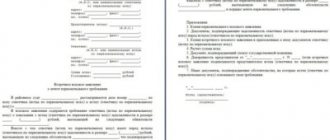Author of the article: Yulia Kaysina Last modified: January 2020 13743
An inheritance is not always a welcome gift, so sometimes you have to think about how to write a statement of refusal of inheritance and how to carry out this procedure without violating the law. Refusal of inheritance is part of inheritance law. If the heir does not want to accept the property bequeathed to him, he has the right to refuse the inheritance. The refusal will serve as the basis for the redistribution of his part of the property to other heirs who are next in line.
How to file a claim for abandonment of inherited property and what consequences this procedure may lead to will be described below.
What is renunciation of inheritance
This means that the heir voluntarily renounces those rights that are automatically assigned to him after the death of the testator. Any persons can be specified in a will, but according to current legislation, only immediate relatives and spouses are involved in dividing the inheritance.
Basic Concepts
Refusal of an inheritance is a standard procedure on a par with receiving an inheritance. The procedure is accompanied by a notary and involves registration of the relevant document in the journal of incoming applications. According to Article 1154 of the Civil Code of the Russian Federation, the heir can refuse the inheritance, both before receiving it and after.
If the heir does not show any initiative to exercise his civil rights, that is, he is in no hurry to enter into an inheritance, then this already indicates his disagreement with the inheritance. In this case, the property is divided among other candidates. However, a verbal agreement alone will not be enough. It is better to write a corresponding statement of refusal of inheritance. In this case, the person interested in the inheritance will be able to reduce the required waiting period for entering into the inheritance (six months) and exercise their rights much earlier.

In addition, such a person will be guaranteed that the heir who has renounced the inheritance will not be able to demand the return of the property due to a missed deadline, even if he makes a corresponding application to the court. A notarized application for refusal of inheritance cannot be annulled, especially if the inheritance has already been distributed among other participants.
Ways to refuse inheritance
Refusal of an inheritance is accomplished by submitting to an official at the place of opening of the inheritance a notary or a notary authorized in accordance with the law to issue certificates of the right to inheritance to an official of the heir’s application for renunciation of the inheritance.
In the event that an application for renunciation of inheritance is submitted to a notary not by the heir himself, but by another person or sent by mail, the heir’s signature on such an application must be certified in the manner established by paragraph two of paragraph 1 of Article 1153 of the Civil Code. Refusal of inheritance through a representative is possible if the power of attorney specifically provides for the authority to do so.
A power of attorney is not required for a legal representative to renounce an inheritance.
The notary at the place of opening of the inheritance, in accordance with the legislation of the Russian Federation, accepts applications for acceptance of the inheritance or refusal of it. An application for acceptance of an inheritance or refusal of it must be made in writing according to the given sample.
The principle of voluntariness in accepting property
There are a number of motivational factors that can force the heir to refuse the inheritance. There is always a possibility that there is a debt hanging over the estate and creditors are demanding repayment of the debt. According to Article 1175 of the Civil Code of the Russian Federation, creditors can indeed demand fulfillment of obligations from a person who received an inheritance from a deceased debtor. Thus, it will not be possible to force the heir to accept the inheritance “automatically”. Here everything is decided on a voluntary basis.
Who can issue a waiver
Only those citizens who are called to receive the inheritance can accept or refuse an inheritance. The circle of heirs may change already in the process of distributing the inheritance. For example, if a first-line heir dies or refuses, the second-line heirs automatically claim the inheritance, etc.
If a minor heir refuses the share
A minor cannot accept or voluntarily refuse an inheritance. An authorized representative is given this instead. Typically, this representative is a parent or legal guardian who can represent the child's rights in such matters.
It is worth noting that the representative must always highlight the benefit for the minor heir. If the inherited property is in debt and even its sale will not cover them, then it is customary to refuse such an inheritance.

Types of refusal:
- The heir may refuse the inheritance. In this case, the heirs of the next line receive the right to inherit the property.
- The primary heir may refuse the inheritance, but redirect his part of the inheritance to a specific addressee.
Other types of refusal of inheritance are not provided for by law.
In favor of another heir
According to Article 1158 of the Civil Code of the Russian Federation, an heir may refuse the inheritance in favor of another heir. In this case, such an heir may either be called to inherit initially or be absent. When drawing up a waiver of inheritance, a sample of which can be found on our website, you must indicate such a wish.
Consequences of refusing an inheritance
Despite the fact that the notary clearly explains to heirs who wish to renounce the inheritance the consequences of such a refusal, nevertheless, many who have already renounced the inheritance are interested in questions about how to cancel the refusal of the inheritance or how to challenge the refusal of the inheritance.
An heir refusing an inheritance must clearly understand and be aware of the consequences of such refusal:
- Refusal of inheritance cannot be revoked (taken back, annulled) or changed (Part 3 of Article 1157 of the Civil Code of the Russian Federation). In other words, one cannot refuse to renounce an inheritance.
- It is impossible to refuse an inheritance with reservations or under conditions (Part 2 of Article 1158 of the Civil Code of the Russian Federation). This means that the refusal of inheritance is unconditional (absolute).
- Refusal of part of the inheritance is prohibited . The heir cannot keep part of the inheritance for himself. If the inheritance includes several pieces of property, then the heir’s refusal of the inheritance entails the transfer of the right to the property in full to another person (Part 3 of Article 1158 of the Civil Code of the Russian Federation).
Meanwhile, the law provides for the possibility of refusing an inheritance that is due to an heir on one of the grounds specified in the law.
For example, an heir is called to inherit both by law and by will, that is, part of the inheritance must go to him according to the will, the rest - by law. In this case, he may refuse the inheritance on one of these grounds . And although in fact there is a refusal of part of the inheritance, legally the heir refuses in full the inheritance due to him within the framework of one of the grounds of inheritance.
If there are grounds provided for by law, refusal of inheritance, like any other unilateral transaction, can be challenged in court (Articles 177-179, 1157-1160 of the Civil Code of the Russian Federation). In this case, it is necessary to remember the statute of limitations.
Consultation with a lawyer on inheritance matters in St. Petersburg. Tel.+7 (812) 989-47-47 Telephone consultation
Registering a document with a notary
Regardless of whether an application for renunciation of inheritance is being drawn up or a renunciation of inheritance is being written in favor of another heir, a sample application for which can be downloaded on our website, everything is subject to a standard procedure, which is carried out at the selected notary office. A notary can be either public or private with the appropriate license.
Any application and documents are registered in a special journal. Thus, simply canceling the application while avoiding legal consequences will definitely not work.

Sample application for renunciation of inheritance
Refusal of an inheritance involves writing a statement of 2 types: 1st - this is the so-called unconditional refusal (the specific heir is not specified); 2nd - when the refusal is carried out in someone’s favor.
- Application for unconditional renunciation of inheritance:
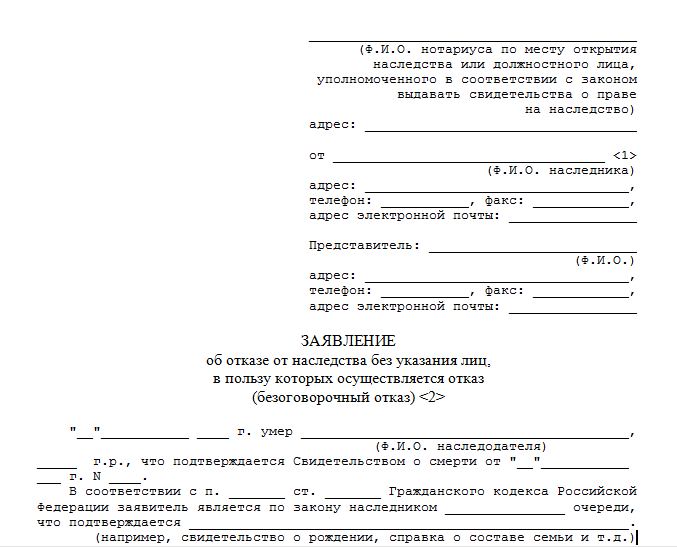
- In the upper right corner, indicate the notary office to which you are sending the refusal of inheritance (either at the place of residence of the deceased, or chosen by him - in the case of a will), as well as on whose behalf the application was drawn up (last name, first name and residential address).
- By .
- The text will look something like this: “I, Ivan Petrovich Ivanov, renounce my share in the inheritance of my father Petr Petrovich Ivanov, who died on January 1, 2014.”
- At the end of the application, the date it was written, as well as the personal signature of the applicant, is indicated. The signature on the application must match the signature on the passport.
- Application for renunciation of inheritance in favor of another heir:
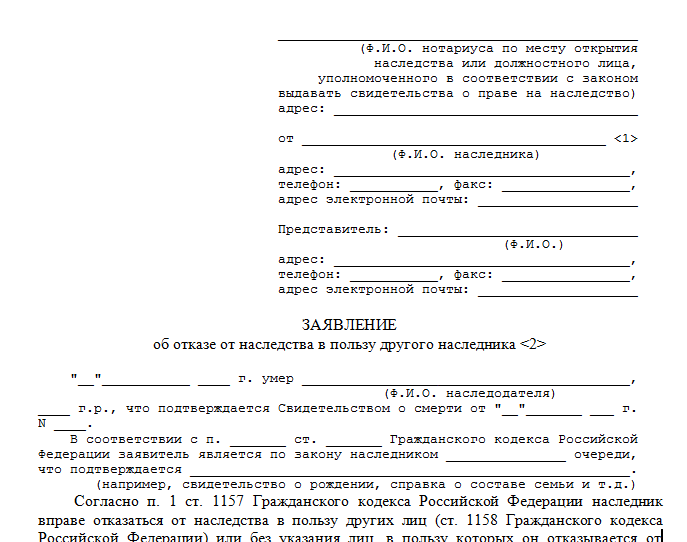
- First, as standard, indicate the name and address of the notary office that is handling the inheritance matter.
Please provide the applicant's details below: last name, first name and patronymic, as well as his residential address.
- The main text roughly looks like this: “On January 1, 2014, my father Petr Petrovich Ivanov, living at the address: Moscow, st. Lenina, 1, apt. 1. After the death of the father, inherited property remained - a one-room apartment located in a five-story building at the address: Moscow, st. Lenina, 1, apt. 1. I refuse my share in the inheritance in favor of Vasily Petrovich Ivanov, the son of the testator, registered at the address: Moscow, st. Lenina, 1 apt. 2".
- The application is completed by the personal signature of the applicant and the date of its preparation.
IMPORTANT! To renounce an inheritance, you will need to write a statement at a notary's office. If you cannot appear to write the application in person, you can send the completed document by mail, express mail or courier. Another option is to write an application through a proxy. A power of attorney drawn up for another person must necessarily contain an indication of the person’s right to carry out actions, including writing and submitting an application for refusal of inheritance.
Unconditional refusal
You may notice that the sample application for refusal of inheritance does not have an address. There is no mistake in this, since the corresponding statement may indeed not be targeted. In this case, the property is distributed among other heirs, and in case of their refusal, the inheritance goes to the state.
Reasons for making such an application:
- Debts that pass along with the inheritance.
- The inherited property is not of good value or is an unnecessary object.
Rules for drawing up an application for refusal of inheritance
First you need to determine the type of application: will you transfer your share to someone, or will you simply renounce it. What matters here is the nature of the transfer of property. When it comes to legal inheritance, you have the right to give your part to a participant in any queue.
In the case of a will, such a maneuver is not possible, since the transfer can only be carried out within the framework of the text of this document. You can give the share to an equal or alternate heir whose name is indicated by the deceased.
A separate point is the renunciation of the obligatory share. A statement of this type will also have its own nuances. In the event that the refusal was not made on time, the issue is subject to resolution in court, where the corresponding application is sent.
Forms of refusal of inheritance
By accepting or refusing an inheritance, the heir does not acquire complete freedom regarding his inheritance rights. There is only a complete or partial renunciation of inheritance.
Full or partial
In case of complete refusal of the inheritance, the heir is completely deprived of his share. This is stated in Article 1158 of the Civil Code of the Russian Federation. In the case of a partial renunciation, the heir is deprived of only a specific share, which can be renounced in whole or in part.
With conditions
The transfer of inheritance from one person to another is only possible if it is specified in the will itself. As for refusal of inheritance, such a rule does not apply here. A person has the legal right to both enter into an inheritance and refuse it completely or partially.
Reasons for refusing inheritance
Those citizens who are heirs by law or by the last will of the deceased have the right to refuse to inherit the property of the testator.
You can write a corresponding petition to a notary even after the 6 months allotted by law have passed.
When representing the interests of a minor or incompetent citizen, the procedure is carried out with representatives of guardianship and trusteeship.
An escheated inheritance can only belong to the state and it is impossible to formalize a written alienation for it.
Only those who are the sole heir under a will or by law (when representing the interests of a minor, incapacitated person) do not have such legal grounds.
There are two types of renunciation: absolute and in favor of other citizens.
- The first case implies the non-acceptance of the testator’s property for anyone’s benefit.
- In the second option, the successor inside the petition specifies those to whom his right of inheritance is transferred by law. It is not necessary to describe the reason for this decision.

Most often, the reason for making such a decision regarding the property of the testator is:
- large financial debt;
- high price for re-registration;
- impossibility of withdrawing a share from real estate;
- place of residence is too remote.
A recorded appeal cannot be recalled if the heir suddenly changes his mind.
Citizens who are adults, capable or competent representatives of the interests of the successor can write such a statement without additional documents.
You cannot simply transfer the right of inheritance to a third party; it is only permissible to indicate another heir to the property of the deceased. These include legal successors in order and persons who have grounds of inheritance through family ties or transmission system.
It is impossible to alienate the property of the deceased to the successor who was legally deprived of such a right (by last will, court decision). Also, a waiver is not issued after filing papers to enter into an inheritance, and vice versa: after the waiver document is written, the inheritance is not formalized.
Cancellation of a petition or selective inheritance of any part of the deceased's property is not permitted.
Features of the procedure
Interested parties contact the notary within a clearly established period, provide the appropriate package of documents and write an application on the spot. A sample application for renunciation of inheritance will speed up the procedure and help you immediately understand what needs to be done and how.

How to formalize a refusal of inheritance:
- Contact a notary in person.
- Submit an application to the MFC.
Application options:
- Apply yourself.
- Use an authorized person.
- Use a trustee (in case of disabled citizens).
Personal appeal to a notary
You can choose any notary at the place where the inheritance is opened. At the time of contacting a notary, inheritance proceedings may already be open. Otherwise, it will be necessary to initiate this procedure initially.
Through a proxy
To do this, it is necessary to draw up a notarized power of attorney, which specifies all the powers of the authorized person. In this case, the notary is provided with an application and a power of attorney.
With the involvement of guardianship and trusteeship authorities
Required in the case of an incapacitated citizen (age or health status due to which a certain category of citizens cannot cope with everyday needs).
By registered mail
Not the best option as there may be delays. However, this method is practiced. It is best to send a registered letter with a return receipt.
Procedure
The heir only needs to prepare the appropriate package of documents. It is worth writing a statement of refusal of inheritance at the place of arrival to the notary, since the heir may not fully understand what share of the inheritance he is entitled to.
Costs when registering a refusal
An application to renounce an inheritance to a court or notary requires payment of a state fee in the amount of 100 rubles. If you involve a trusted person, the state duty will be twice as much. Notary fees depend on the technical and legal work.
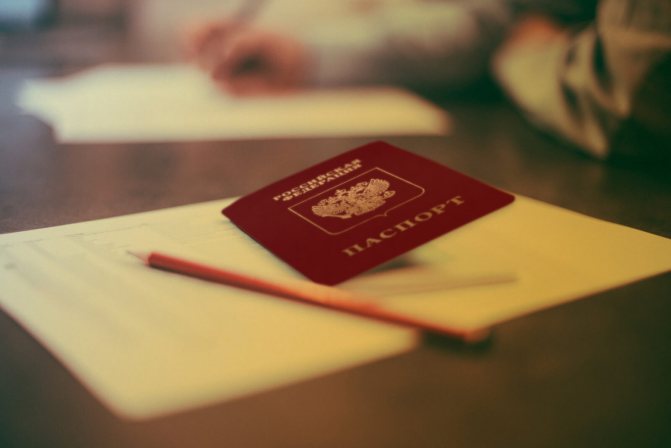
Application form and contents of the document
The form and recommendations for filling out the application can be obtained on site from the notary. The application does not require a strict form. However, using a sample application for renunciation of inheritance will help you better understand how such a document is filled out and in what order everything needs to be written down.
Application structure:
- Application header (full name of the application and name of the notary office).
- The main part of the statement.
- Signature and date.

What should be in the content part
It is necessary to indicate personal data, as well as the nuances of the current situation. Next, the desire to refuse the inheritance or make a concession to another person is indicated.
What documents are attached?
In the case of an open case, it is necessary to provide a death certificate of the testator, as well as property documentation. Such documents are not attached to the case.
Required documents for an application for renunciation of inheritance
The documents attached to the application for refusal are similar to those collected when registering inheritance rights.
It is necessary to provide the employee of the notary office with:
- heir's identity card;
- death certificate;
- statement of refusal;
- a certificate from the house register at the address of registration or actual residence of the testator for the last time;
- confirmation of family ties (birth certificate, marriage or divorce, change of surname, etc.);
- data on the last place of residence of the deceased (sample No. 3);
- successor's TIN;
- papers confirming the testator's ownership of the inherited possessions;
- confirmation of the value of the property (appraisal report, cadastral or inventory value);
- documents on the non-property rights of the heir;
- a will, if one has been drawn up.
Going to court: how to choose an instance
In the case of an individual, the authority is selected at the place of residence of this person. In the case of a legal entity, the authority is selected at the place of registration of the organization.
Grounds for appealing an inheritance
According to the law, it is prohibited to forcefully award an inheritance to an heir. Otherwise, you should go to court. This can be done after the refusal of the inheritance, arguing that the refused heir was mistaken in the nature of the transaction.
Filing a claim in court
The application is sent to the city or district court at the defendant’s place of residence. The application is drawn up in strict form, in accordance with Article 131 of the Code of Civil Procedure of the Russian Federation.
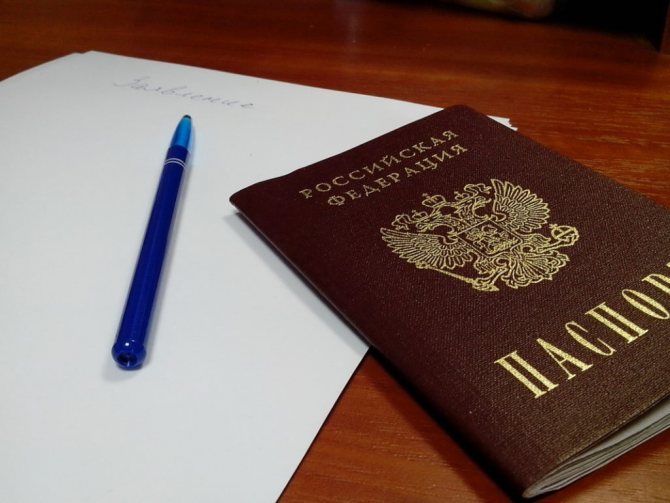
Required documents
The required package of documents is specified in Article 132 of the Code of Civil Procedure of the Russian Federation:
- Receipt for payment of state duty.
- Notarized power of attorney (if required).
- Confirmation of conflict resolution without judicial intervention.
- Evidence of claims.
- Calculation of the amount if compensation is required due to a lost share of inheritance.
Limitation of actions
Having written a refusal of inheritance, the potentially interested person will have one year to apply to the court with a corresponding application.
Alternative to refusal
It is not necessary to write an application for a complete renunciation of the inheritance. You can take advantage of the available opt-out alternatives.
Gift deed
It is impossible to give a share of an inheritance without the procedure for entering into this inheritance. Thus, you must first accept the inheritance, and then draw up a deed of gift.
Making a will
If the testator has a will in which specific persons are not registered, then they do not need to write a statement, since they will not be considered called to inherit. The exception is the contents, who are entitled to a certain share of the inheritance by law.

Failure to accept inheritance within 6 months
If the document on acceptance of the inheritance is not completed on time, the person will be considered an unrecognized heir. An exception is the guardianship authorities, which, if the successor is incapacitated, may ask why the parent or guardian does not enter into the inheritance.
A few important nuances:
- It is impossible to cancel the desire to voluntarily renounce the inheritance.
- There are no restrictions on refusing an inheritance.
- An application for refusal of inheritance in the case of an incapacitated or minor person can be submitted only after obtaining the appropriate permission from a parent or guardian.




